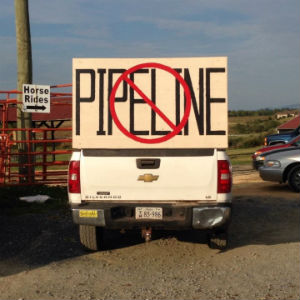
The study strongly refutes claims made by the sponsoring companies of both proposed pipelines that the projects are needed to assure continued delivery of natural gas from the Marcellus and Utica shale fields to markets in Virginia and North Carolina. The report also concludes that industry overbuilding of unnecessary pipelines will cripple consumers’ access to non-carbon energy sources for decades to come.
“This is just one more study that confirms what we’ve been saying from the beginning: that the very concept of building the ACP is ill-conceived,” says Randy Whiting of Friends of Nelson. “ It puts everyone at risk. Not just the impacted landowners but also both the ratepayers who will be forced to shoulder the cost of unnecessary capacity, and the investors who have been hoodwinked by Dominion into thinking that the ACP will be gold.”
The report states that “the cost of building the pipeline, including the profit for the developers, will be passed through to the shippers of the pipeline who will be able to recover it from their ratepayers through rates established by state public service commissions….the regulatory structure gives Duke and Dominion an incentive to prioritize building their own pipeline rather than using that of another company. If the demand for the capacity along the Atlantic Coast Pipeline does not materialize, ratepayers will still be on the hook to pay for that capacity.”
The study recommends that
- The applications for the Atlantic Coast and Mountain Valley pipelines be suspended until a regional planning process can be developed for pipeline infrastructure;
- FERC lower the returns on equity granted to pipeline developers; and
- An investigation be conducted into the relatively high failure rate of new pipelines.
“Constructing multiple massive pipelines through a region and asking the people of that region to bear both the environmental and financial costs for it without the Federal Energy Regulatory Commission determining if the infrastructure is even needed is irresponsible at best,” says Whiting.
An earlier study by Key-Log Economics concluded that costs related to the Atlantic Coast pipeline for Nelson, Augusta, Buckingham and Highland Counties would exceed $100 million annually plus an additional one-time cost of $141 million. These costs include losses to citizens, recreation and real estate income, property values and tax revenues to the counties.
“Dominion wants to waste billions of ratepayer dollars unnecessarily while subsidizing their profits on the backs of Virginia’s property owners and taxpayers,” said Ernie Reed, President of Friends of Nelson. “We cannot let this happen.”










